
Joseph Conrad was a Polish-British novelist and story writer. He is regarded as one of the greatest writers in the English language and, although he did not speak English fluently until his twenties, he became a master prose stylist who brought a non-English sensibility into English literature. He wrote novels and stories, many in nautical settings, that depict crises of human individuality in the midst of what he saw as an indifferent, inscrutable, and amoral world.

Sense and Sensibility is the first novel by the English author Jane Austen, published in 1811. It was published anonymously: By A Lady appears on the title page where the author's name might have been.

Ford Madox Ford was an English novelist, poet, critic and editor whose journals The English Review and The Transatlantic Review were important in the development of early 20th-century English and American literature.
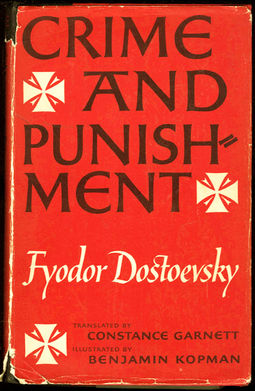
Crime and Punishment is a novel by the Russian author Fyodor Dostoevsky. It was first published in the literary journal The Russian Messenger in twelve monthly installments during 1866. It was later published in a single volume. It is the second of Dostoevsky's full-length novels following his return from ten years of exile in Siberia. Crime and Punishment is considered the first great novel of his mature period of writing and is often cited as one of the greatest works of world literature.

William Godwin was an English journalist, political philosopher and novelist. He is considered one of the first exponents of utilitarianism and the first modern proponent of anarchism. Godwin is most famous for two books that he published within the space of a year: An Enquiry Concerning Political Justice, an attack on political institutions, and Things as They Are; or, The Adventures of Caleb Williams, an early mystery novel which attacks aristocratic privilege. Based on the success of both, Godwin featured prominently in the radical circles of London in the 1790s. He wrote prolifically in the genres of novels, history and demography throughout his life.

The Sorrows of Young Werther, or simply Werther, is a 1774 epistolary novel by Johann Wolfgang Goethe, which appeared as a revised edition in 1787. It was one of the main novels in the Sturm und Drang period in German literature, and influenced the later Romantic movement. Goethe, aged 24 at the time, finished Werther in five and a half weeks of intensive writing in January to March 1774. It instantly placed him among the foremost international literary celebrities and was among the best known of his works. The novel is made up of biographical and auto-biographical facts in relation to two triangular relationships and one individual: Goethe, Christian Kestner, and Charlotte Buff ; Goethe, Peter Anton Brentano, Maximiliane von La Roche, and Karl Wilhelm Jerusalem, who died by suicide on the night of Oct 29 or 30, 1772. He shot himself in the head with a pistol borrowed from Kestner. The novel was adapted as the opera Werther by Jules Massenet in 1892.

The Inheritors: An Extravagant Story (1901) is a quasi-science fiction novel on which Joseph Conrad and Ford Madox Ford collaborated. Written before the first World War, its themes of corruption and the effect of the 20th century on British aristocracy were prescient. It was first published in London by William Heinemann and later the same year in New York by McClure, Phillips and Company.

The Brothers Karamazov, also translated as The Karamazov Brothers, is the last novel by Russian author Fyodor Dostoevsky. Dostoevsky spent nearly two years writing The Brothers Karamazov, which was published as a serial in The Russian Messenger from January 1879 to November 1880. Dostoevsky died less than four months after its publication. It has been acclaimed as one of the supreme achievements in world literature.
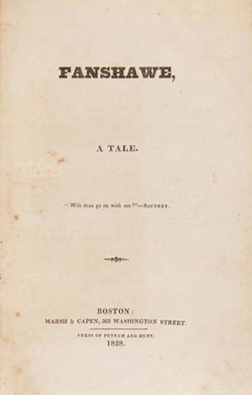
Fanshawe is a novel written by American author Nathaniel Hawthorne. It was his first published work, which he published anonymously in 1828.
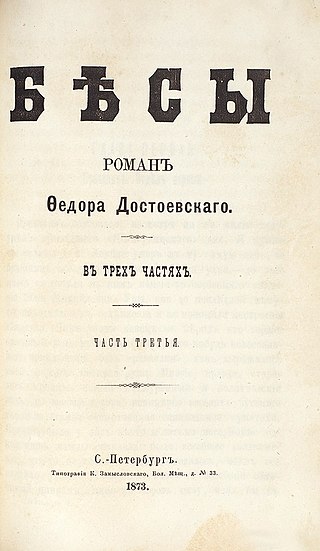
Demons is a novel by Fyodor Dostoevsky, first published in the journal The Russian Messenger in 1871–72. It is considered one of the four masterworks written by Dostoevsky after his return from Siberian exile, along with Crime and Punishment (1866), The Idiot (1869), and The Brothers Karamazov (1880). Demons is a social and political satire, a psychological drama, and large-scale tragedy. Joyce Carol Oates has described it as "Dostoevsky's most confused and violent novel, and his most satisfactorily 'tragic' work." According to Ronald Hingley, it is Dostoevsky's "greatest onslaught on Nihilism", and "one of humanity's most impressive achievements—perhaps even its supreme achievement—in the art of prose fiction."
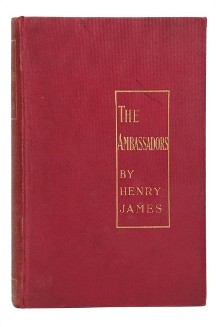
The Ambassadors is a 1903 novel by Henry James, originally published as a serial in the North American Review (NAR). The novel is a dark comedy which follows the trip of protagonist Lewis Lambert Strether to Europe to bring the son of his widowed fiancée back to the family business. The novel is written in the third-person, from Strether's point of view.

The Good Soldier: A Tale of Passion is a 1915 novel by the British writer Ford Madox Ford. It is set just before World War I, and chronicles the tragedy of Edward Ashburnham and his seemingly perfect marriage, along with that of his two American friends. The novel is told using a series of flashbacks in non-chronological order, a literary technique that formed part of Ford's pioneering view of literary impressionism. Ford employs the device of the unreliable narrator to great effect, as the main character gradually reveals a version of events that is quite different from what the introduction leads the reader to believe. The novel was loosely based on two incidents of adultery and on Ford's messy personal life, specifically “the agonies Ford went through with his wife and his mistress in the six preceding years."

The Secret Agent: A Simple Tale is an anarchist spy fiction novel by Polish-British author Joseph Conrad, first published in 1907. The story is set in London in 1886 and deals with Mr. Adolf Verloc and his work as a spy for an unnamed country. The Secret Agent is one of Conrad's later political novels in which he moved away from his former tales of seafaring. The novel is dedicated to H. G. Wells and deals broadly with anarchism, espionage, and terrorism. It also deals with exploitation of the vulnerable in Verloc's relationship with his brother-in-law Stevie, who has an intellectual disability. Conrad’s gloomy portrait of London depicted in the novel was influenced by Charles Dickens’ Bleak House.

Oroonoko: or, the Royal Slave is a work of prose fiction by Aphra Behn (1640–1689), first published in 1688 by William Canning and reprinted later that year in the compilation Three Histories by Mrs. A. Behn. The eponymous hero is an African prince from Coramantien who is tricked into slavery and sold to European colonists in Surinam where he meets the narrator. Behn's text is a first-person account of Oroonoko's life, love, and rebellion.

"The Secret Sharer" is a short story by Polish-British author Joseph Conrad, originally written in 1909 and first published in two parts in the August and September 1910 editions of Harper's Magazine. It was later included in the short story collection Twixt Land and Sea (1912).

Under Western Eyes is a 1911 novel by Joseph Conrad. The novel takes place in St. Petersburg, Russia, and Geneva, Switzerland, and is viewed as Conrad's response to the themes explored in Fyodor Dostoevsky's Crime and Punishment; Conrad was reputed to have detested Dostoevsky. It has also been interpreted as Conrad's response to his own early life; his father was a Polish independence activist and would-be revolutionary imprisoned by the Russians, but, instead of following in his father's footsteps, at the age of sixteen Conrad left his native land, only to return briefly decades later. Indeed, while writing Under Western Eyes, Conrad suffered a weeks-long breakdown during which he conversed with the novel's characters in Polish.
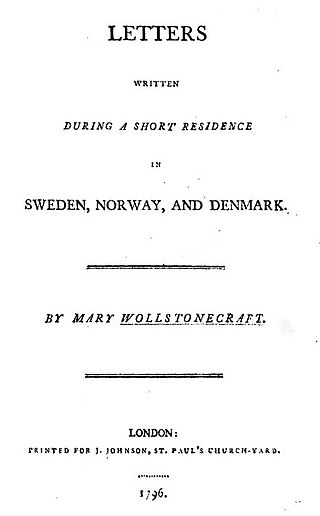
Letters Written During a Short Residence in Sweden, Norway, and Denmark (1796) is a personal travel narrative by the eighteenth-century British feminist writer Mary Wollstonecraft. The twenty-five letters cover a wide range of topics, from sociological reflections on Scandinavia and its peoples to philosophical questions regarding identity. Published by Wollstonecraft's career-long publisher, Joseph Johnson, it was the last work issued during her lifetime.
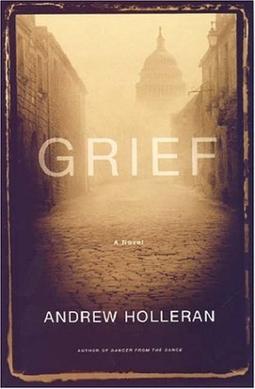
Grief is a novel by American author Andrew Holleran, published in 2006. The novel takes place in Washington D.C., following the personal journey of a middle-aged, gay man dealing with the death of his mother. The novel received the 2007 Stonewall Book Award.

Dreams of My Russian Summers is a French novel by Andrei Makine, originally published in 1995. It won two top French awards, the Prix Goncourt and the Prix Médicis. The novel is told from the first-person perspective and tells the fictional story of a boy's memories and experiences with his French grandmother in the Soviet Union in the 1960s and '70s.
Richard Curle (1883–1968) was a Scottish author, critic, and journalist. He was a friend of the novelist Joseph Conrad, who was also the subject of several of his critical works.



















